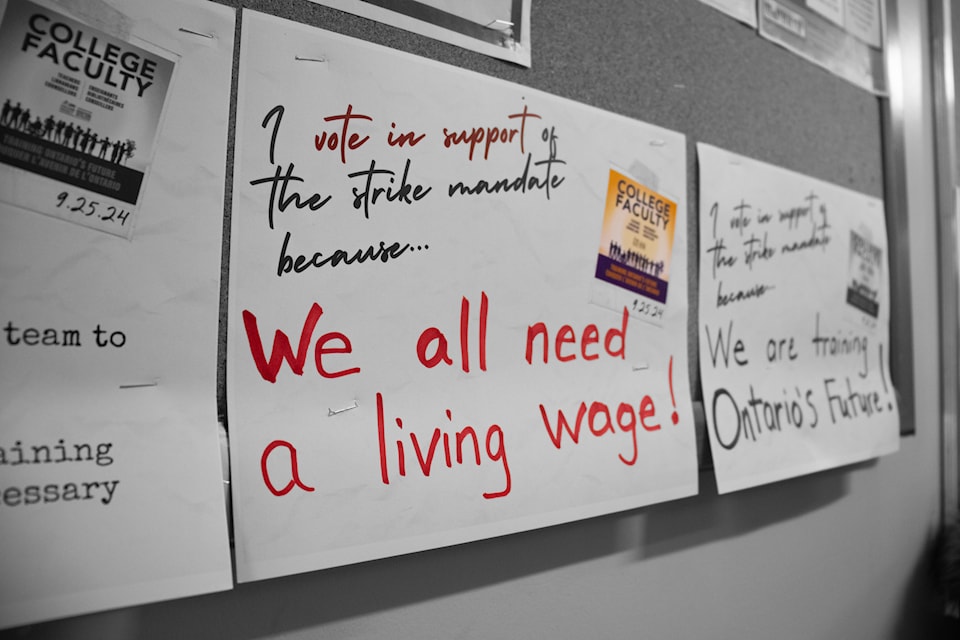Faculty members voted 79 per cent in favour of authorizing a strike in necessary.
Results of the vote released Friday show 11,848 members, or 76.1 per cent, cast a ballot. The mandate will reinforce the position held by the bargaining team in talks with the College Employer Council (CEC).
Members of the Ontario Public Service Employees Union began voting electronically on Tuesday and continued until noon Friday. It was extended by a day because of technical issues at Centennial College. Some members did not receive voting credentials.
The contract has officially expired on Sept. 30. The union and CEC have entered conciliation with first one conducted on Oct. 9 and the second on Oct. 15.
During conciliation, an attempt to settle is made with the assistance of the conciliator. A conciliator is appointed by the Ministry of Labour who meets both parties individually and together. Conciliation is generally opted to help facilitate talks and lasts as long as both parties agree to keep meeting.
Ontario College Faculty (CAAT-A) includes around 15,000 full-time and partial-load professors, counsellors, librarians and instructors. The voting was done through a web-based voting system supervised by the Ontario Labour Relations Board (OLRB).
The casting was done via email or phone, using a unique elector ID number and PIN needed to vote.
The bargaining committee requires a 50 plus one majority of the total number of votes cast to go on a strike.
A successful vote mandate doesn’t necessarily mean a strike. Faculty can decide to opt for work-to-rule which means the classes would continue as normal unless the union decides otherwise. Alternative options include partial walk-out, rotating strikes and a complete walk-out.
In a partial walk-out, employees refuse to perform some of their assigned duties. A rotating strike means employees walk out for short periods at different institutions.
In a full strike, employees withdraw all their services and choose to walk the picket line.
The CEC could also lock out faculty.
There has been a total of seven strikes at 24 Ontario Public Colleges since 1979 with the longest lasting one in 2017, lasting a bit over five weeks. While the government doesn’t get involved with bargaining issues, the government forced faculty back to work after five weeks of a full walk-out by passing strike-ending legislation.
Following the last strike, the Ministry of Advanced Education provided students with a full tuition refund if they decided to not continue with a condensed semester. Some colleges decided to keep the ancillary or the health insurance fee.
The students also were eligible to receive up to $500 for unexpected costs they incurred because of the labour dispute, such as childcare fees, rebooked train or bus tickets, or rent.
As the talks continue, OPSEU has allegedly claimed the CEC was spreading disinformation.
JP Hornick, president of OPSEU, said in an Oct. 9 video that she was not surprised by the amount of disinformation circulated.
Some of major points of tension have been establishing a certain student-to-counsellor ratio and librarians. However, CEC has said this would mean hiring 233 per cent more full-time counsellors and librarians.
OPSEU said the number presented by the council highlights the need for appropriate staffing.
The union also wanted to bring down the hours of full-time faculty work hour to 40 hours from 44 hours. CEC argues such a reduction can bring average teaching hours to 8.76 from 12.01 hours per week for full-time teachers, and reduce the number of teaching weeks to a maximum of 29 weeks annually.
Other major demands include a guaranteed six-week period of self-directed non-teaching time per year along with a 50 per cent increase in professional development days. OPSEU has argued that while non-teaching periods are necessary to ensure programs meet accreditation standards, professional development days are needed amidst rapidly changing teaching environments.
CEC said the cost of IRCC’s recent changes regarding the cap on international students to be more than $3 billion in the next two years. The CEC said on its website that it has tried to engage the union to find a common ground as the system is going through ‘’a time of tremendous upheaval.’’
OPSEU has argued that colleges have the money to commit to quality education estimating a surplus of billions.
The College Student Alliance (CSA) in a blog has advised students to stay informed and be prepared for any changes to the academic calendar and evaluate the personal, academic and financial impact of any work stoppage.




